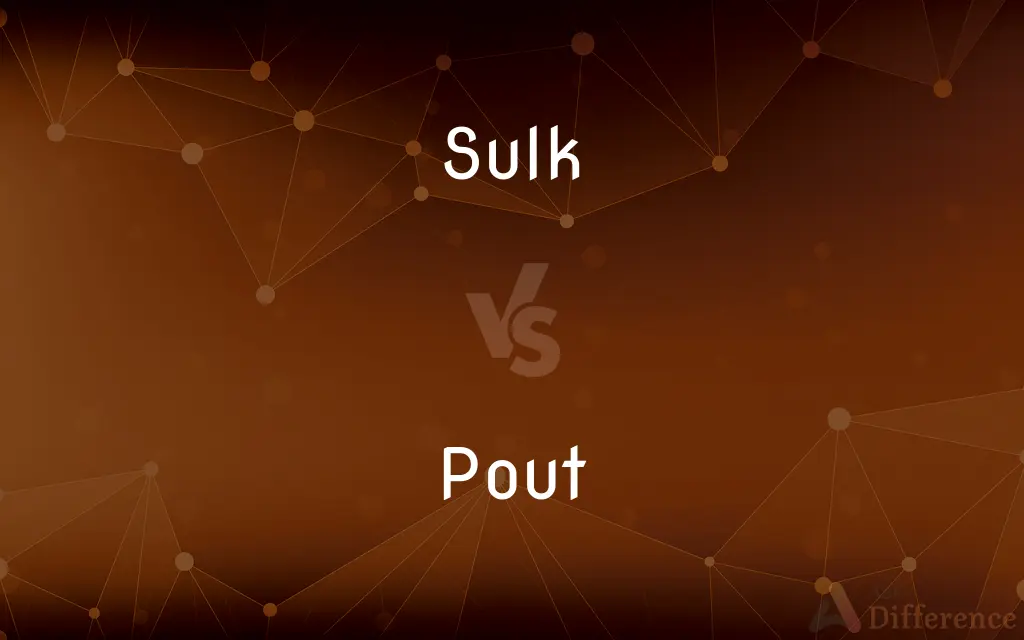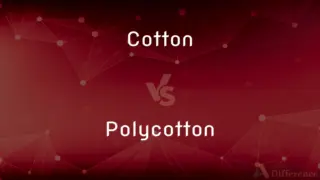Sulk vs. Pout — What's the Difference?
By Urooj Arif & Maham Liaqat — Updated on April 8, 2024
Sulking involves withdrawing in silent displeasure or resentment, while pouting is showing displeasure through protruding lips, often considered less serious.

Difference Between Sulk and Pout
Table of Contents
ADVERTISEMENT
Key Differences
Sulking is a behavior characterized by withdrawing from others and maintaining a silent, moody demeanor as a response to disappointment or resentment. It often involves brooding in silence and can be seen as a more internalized way of dealing with negative emotions. Pouting, on the other hand, is more externalized and typically involves protruding the lips and sometimes crossing the arms or displaying a sullen facial expression as a way of expressing displeasure or annoyance.
While both sulking and pouting are responses to negative feelings or situations, sulking is generally considered a more subdued and prolonged behavior, indicative of deeper emotional turmoil or dissatisfaction. Pouting, conversely, is often viewed as a less intense, more immediate reaction to a specific cause of upset and is sometimes perceived as seeking attention or sympathy.
Sulkers tend to seek isolation and may be less communicative about the reasons for their discontent, preferring to stew in their emotions. Pouters, however, might still engage with others and their expression of displeasure is more visibly noticeable, often through facial expressions and body language that suggest they are upset but not entirely withdrawn.
The context in which sulking and pouting occur can also differ. Sulking might happen after a significant event that causes emotional distress or frustration, and it can last for an extended period. Pouting is more likely to be a reaction to minor grievances or disappointments and is typically short-lived, with the individual returning to their normal demeanor once the immediate cause of displeasure is addressed or forgotten.
Despite their differences, both sulking and pouting can be mechanisms for coping with unhappiness or dissatisfaction. However, the manner and duration of these behaviors can significantly affect how they are perceived by others; sulking might be seen as a more serious indicator of unhappiness, while pouting is often associated with less severe discontent or used in a somewhat playful or manipulative manner to elicit a specific response from others.
ADVERTISEMENT
Comparison Chart
Definition
Withdrawing in silent displeasure
Showing displeasure through facial expression
Emotional Depth
Deeper, more prolonged emotional state
Less intense, often short-lived
Communication
Less communicative, seeks isolation
More communicative, visible expression
Cause
Significant emotional distress
Minor grievances or disappointments
Perception
Seen as more serious
Considered less serious, sometimes playful
Compare with Definitions
Sulk
Indicates deeper emotional turmoil.
She sulked for days, unable to get over the disappointment.
Pout
Expressing displeasure with facial expressions.
She pouted when she didn't get her way.
Sulk
Often involves brooding.
He spent the evening sulking over the lost opportunity.
Pout
Typically short-lived.
Her pout quickly turned into a smile when she was offered ice cream.
Sulk
Seeks isolation.
Choosing to sulk, she avoided conversation with her family.
Pout
Can be playful or manipulative.
With a pout, she convinced her friend to stay longer.
Sulk
Reflects prolonged unhappiness.
His sulking behavior suggested he was deeply hurt by the comments.
Pout
Often seen as seeking attention.
He pouted, hoping someone would ask what was wrong.
Sulk
Withdrawing silently.
After the argument, he chose to sulk in his room.
Pout
Associated with minor upsets.
Pouting, she expressed her annoyance at the cancelled plans.
Sulk
Sulk is the second studio album by Scottish pop band the Associates. It was released on 14 May 1982 on their own Associates imprint of Beggars Banquet Records for the UK and throughout the rest of Europe on WEA Records and in the US on 4 October by Sire Records.
Pout
To exhibit displeasure or disappointment; sulk.
Sulk
Be silent, morose, and bad-tempered out of annoyance or disappointment
He was sulking over the break-up of his band
Pout
To protrude the lips in an expression of displeasure or sulkiness.
Sulk
A period of sulking
She was in a fit of the sulks
Pout
To project or protrude
The child's lips pouted.
Sulk
To be sullenly aloof or withdrawn, as in silent resentment or protest.
Pout
To push out or protrude (the lips).
Sulk
A mood or display of sullen aloofness or withdrawal
Stayed home in a sulk.
A case of the sulks.
Pout
To utter or express with a pout.
Sulk
To express ill humor or offence by remaining sullenly silent or withdrawn.
Pout
A protrusion of the lips, especially as an expression of sullen discontent.
Sulk
A state of sulking.
Leo has been in a sulk all morning.
Pout
Often pouts A fit of petulant sulkiness
Sat around in the house in a pout.
Had the pouts.
Sulk
A person who sulks
Don't be such a sulk, Leo!
Pout
Any of various freshwater or marine fishes having a large head, especially an eelpout or a bullhead.
Sulk
A furrow.
Pout
(intransitive) To push out one's lips.
Sulk
A furrow.
Pout
(intransitive) To thrust itself outward; to be prominent.
Sulk
To be silently sullen; to be morose or obstinate.
Pout
(intransitive) To be or pretend to be ill-tempered; to sulk.
Sulk
A mood or display of sullen aloofness or withdrawal;
Stayed home in a sulk
Pout
(transitive) To say while pouting.
"Don't you love me any more?" she pouted.
Sulk
Be in a huff and display one's displeasure;
She is pouting because she didn't get what she wanted
Pout
(Scotland) To shoot poults.
Pout
One's facial expression when pouting.
Pout
A fit of sulking or sullenness.
Pout
(rare) Any of various fishes such as the hornpout (Ameiurus nebulosus, the brown bullhead), the pouting (Trisopterus luscus) and the eelpouts (Zoarcidae).
Pout
The young of some birds, as grouse; a young fowl.
Pout
A sullen protrusion of the lips; a fit of sullenness.
Pout
The European whiting pout or bib.
Pout
To shoot pouts.
Pout
To thrust out the lips, as in sullenness or displeasure; hence, to look sullen.
Thou poutest upon thy fortune and thy love.
Pout
To protrude.
Pout
A disdainful pouting grimace
Pout
Marine eellike mostly bottom-dwelling fishes of northern seas
Pout
Catfish common in eastern United States
Pout
Be in a huff and display one's displeasure;
She is pouting because she didn't get what she wanted
Pout
Make a sad face and thrust out one's lower lip;
Mop and mow
The girl pouted
Common Curiosities
Is pouting always negative?
Not necessarily; pouting can be playful or used as a light-hearted way to express displeasure without deep resentment.
Can pouting be manipulative?
Yes, pouting can sometimes be used manipulatively to elicit a specific response or sympathy from others.
Are there cultural differences in how sulking and pouting are perceived?
Yes, cultural norms can influence the perception and acceptability of sulking and pouting, with some cultures being more tolerant of these behaviors than others.
What causes someone to sulk?
Sulking is often a response to significant emotional distress, disappointment, or resentment, leading to withdrawal and silence.
Why do people pout?
People might pout as an immediate, visible way to show displeasure or disappointment, sometimes hoping to elicit a specific reaction from others.
Is there a positive aspect to sulking?
While generally seen as negative, sulking can be a signal that someone needs space to deal with their emotions or that an issue needs to be addressed within a relationship.
How long does pouting last?
Pouting is usually short-lived, resolving quickly once the immediate cause of displeasure is addressed or forgotten.
How can one stop sulking?
Recognizing the emotions behind the behavior and addressing the cause directly or seeking constructive ways to express feelings can help.
What is the best way to respond to someone sulking?
Responding to someone sulking may involve giving them space to process their emotions or gently encouraging them to talk about what's bothering them.
Is it healthy to sulk?
While it's normal to feel upset, prolonged sulking without addressing the underlying issues can be unhealthy and hinder emotional resolution.
Do sulking and pouting achieve the same outcomes?
The outcomes can vary; sulking might lead to prolonged feelings of unhappiness, while pouting could result in immediate attention or resolution of minor grievances.
Can sulking affect relationships?
Yes, sulking can strain relationships, especially if it leads to prolonged periods of silence and withdrawal without communication.
What distinguishes a sulk from a pout in terms of resolution?
Sulking may require more time and effort to resolve the underlying issues, while pouting can often be resolved more quickly and with less effort.
How does pouting affect communication?
Pouting can sometimes open up a dialogue by visibly showing others that something is wrong, although it may not always be the most effective communication strategy.
Share Your Discovery

Previous Comparison
Fee vs. Tariff
Next Comparison
Cotton vs. PolycottonAuthor Spotlight
Written by
Urooj ArifUrooj is a skilled content writer at Ask Difference, known for her exceptional ability to simplify complex topics into engaging and informative content. With a passion for research and a flair for clear, concise writing, she consistently delivers articles that resonate with our diverse audience.
Co-written by
Maham Liaqat













































